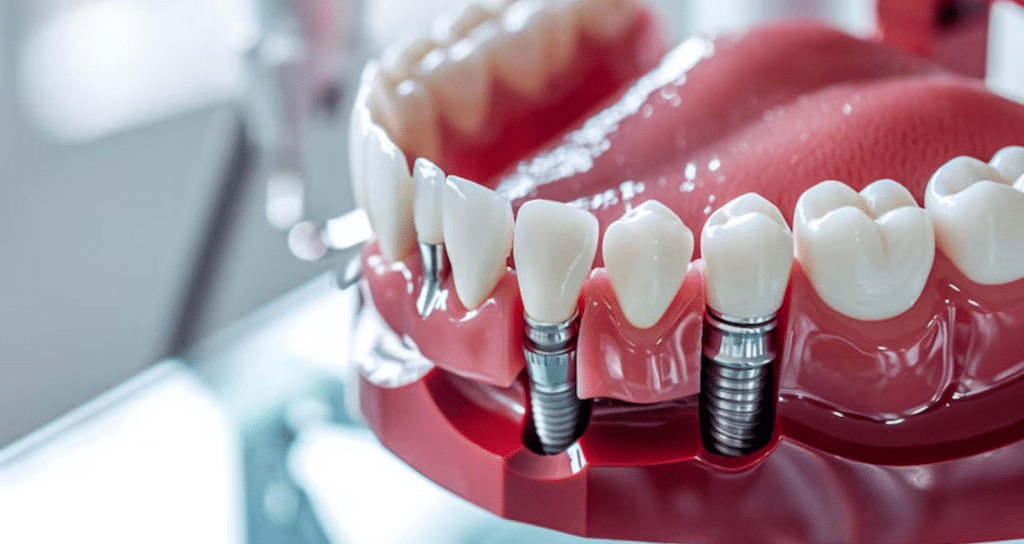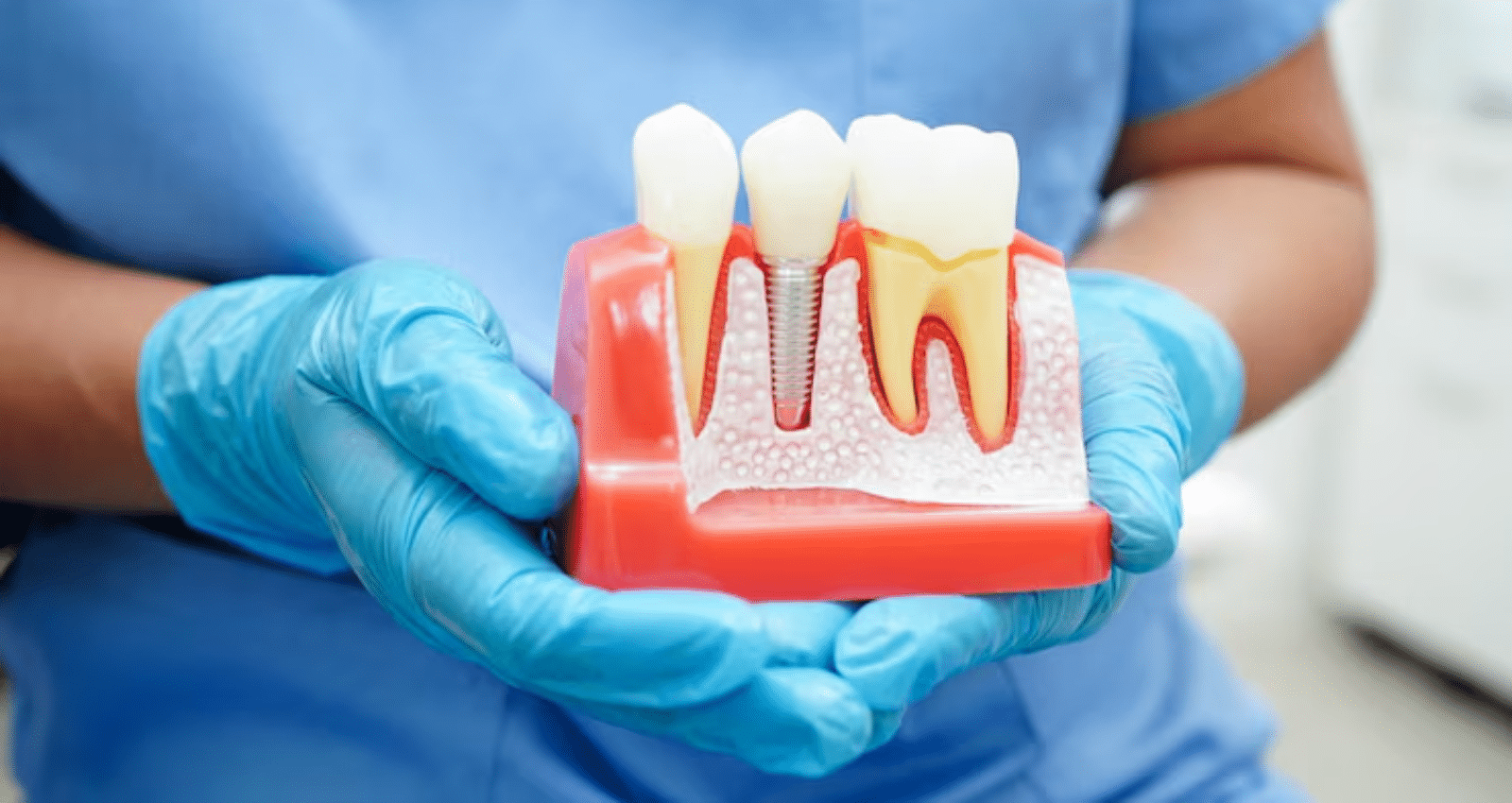Top 5 Mistakes to Avoid After Your Dental Implant Procedure
Dental implants are a revolutionary solution for replacing missing teeth, offering a natural look and lasting functionality. However, the success of this procedure hinges not just on the surgical skill of your dentist but also on how you care for yourself in the days, weeks, and months following the surgery. By avoiding common mistakes and adhering to proper post-operative care, you can ensure that your dental implant heals well and serves you for many years. In this comprehensive guide, we will discuss the top five mistakes to avoid after your dental implant procedure and provide valuable tips for managing pain, choosing the right foods, and maintaining a healthy lifestyle.
Dental Implant Procedure
Before we discuss the mistakes to avoid, it’s important to understand what happens during a dental implant procedure. The process typically involves the following steps:
- Initial Consultation and Planning: Your dentist will assess your oral health, take X-rays, and create a treatment plan tailored to your needs.
- Implant Placement: During the surgical procedure, your dentist places a titanium post into the jawbone. This post will eventually integrate with the bone through a process called osseointegration.
- Healing Period: After the implant is placed, you will enter a healing period during which the implant integrates with the bone. This can take several months.
- Abutment and Crown Placement: Once healing is complete, an abutment is attached to the implant, and a custom crown is placed on top to complete the restoration.
Understanding this process helps highlight why careful post-operative care is essential for a successful outcome.

Top 5 Mistakes to Avoid After Implant Surgery
1. Neglecting Post-Operative Care Instructions
After your dental implant surgery, your dentist will provide specific instructions to ensure proper healing and the success of the implant. Ignoring these guidelines is one of the most common mistakes and can lead to complications.
Why It’s Important
- Promotes Healing: Following instructions help ensure that the implant site heals properly and integrates with the jawbone.
- Prevents Complications: Adhering to care instructions reduces the risk of infection, implant failure, and other issues.
- Manages Discomfort: Proper care helps manage post-operative discomfort and promotes a smoother recovery.
Key Instructions to Follow
- Avoid Hard Foods: Stick to soft foods and avoid hard, crunchy, or sticky items that could disrupt the healing process.
- Follow Medication Guidelines: Take any prescribed antibiotics or pain medications as directed to help with healing and manage discomfort.
- Maintain Oral Hygiene: Continue brushing and flossing, but use gentle techniques and follow any specific recommendations for cleaning around the implant.
2. Ignoring Oral Hygiene
Good oral hygiene is crucial for the health of your implant and surrounding teeth. Neglecting your oral hygiene routine can lead to issues such as plaque buildup, infection, and implant failure.
Why It’s Important
- Prevents Infection: Regular cleaning reduces the risk of infection around the implant site.
- Maintains Implant Health: Good oral hygiene helps keep the implant and surrounding teeth healthy, extending the life of your restoration.
- Overall Oral Health: Proper cleaning supports overall oral health and prevents complications that could affect the implant.
Oral Hygiene Tips
- Brush Gently: Use a soft-bristled toothbrush and non-abrasive toothpaste to clean your teeth and implant area. Be gentle to avoid irritating the surgical site.
- Floss Daily: Floss around the implant using unwaxed floss or interdental brushes to remove plaque and food particles.
- Use Antimicrobial Mouthwash: Rinse with an antimicrobial mouthwash to help reduce bacteria and maintain oral health.
3. Smoking and Using Tobacco Products
Smoking and using tobacco products can significantly impact the success of your dental implant procedure. Tobacco use can impair healing and increase the risk of complications.
Why It’s Important
- Delays Healing: Smoking reduces blood flow to the gums, which can slow down the healing process and affect implant integration.
- Increases Infection Risk: Tobacco use can weaken the immune system, making you more susceptible to infections around the implant.
- Higher Failure Rate: Studies indicate that smokers have a higher rate of implant failure compared to non-smokers.
Tips for Quitting
- Seek Support: Consider joining a smoking cessation program or seeking help from a healthcare professional to quit smoking.
- Avoid Triggers: Identify and avoid situations that trigger your smoking habits.
- Find Alternatives: Replace smoking with healthier habits such as exercise or meditation to manage stress and cravings.
4. Failing to Attend Follow-Up Appointments
Follow-up appointments are essential for monitoring the progress of your dental implant and ensuring that it is healing properly. Skipping these appointments can lead to undetected issues and compromise the success of your implant.
Why It’s Important
- Monitor Healing: Regular check-ups allow your dentist to assess the healing process and ensure that the implant is integrating well with the bone.
- Early Detection of Issues: Addressing any complications or issues early can prevent further problems and ensure the longevity of your implant.
- Adjustments and Maintenance: Follow-up visits provide an opportunity for necessary adjustments and discuss ongoing care and maintenance.
What to Expect
- Initial Follow-Up: Your first follow-up appointment is usually scheduled a few weeks after the procedure to check the initial healing.
- Ongoing Visits: Subsequent visits may be scheduled at regular intervals to monitor progress and address any concerns.
5. Overlooking Diet and Lifestyle Changes
Your diet and lifestyle choices can significantly impact the success of your dental implant. Ignoring recommended changes can lead to complications and affect the longevity of your implant.
Why It’s Important
- Supports Healing: A balanced diet supports the healing process and provides essential nutrients for tissue repair and bone health.
- Avoids Damage: Certain foods and habits can put stress on your implant and surrounding teeth, potentially leading to issues.
- Promotes Long-Term Success: Healthy habits contribute to the long-term success and maintenance of your dental implant.
Dietary Tips
- Eat Soft Foods: Stick to soft foods and avoid hard, sticky, or chewy items that can disrupt the healing process.
- Maintain a Balanced Diet: Include a variety of nutrients in your diet, such as vitamins and minerals, to support overall health and healing.
- Stay Hydrated: Drink plenty of water to maintain hydration and oral health.
Lifestyle Tips
- Limit Alcohol Consumption: Excessive alcohol can impair healing and increase the risk of complications. Moderation is key.
- Manage Stress: High stress levels can negatively impact your overall health and healing process. Engage in stress-relieving activities like exercise or relaxation techniques.
Managing Post-Operative Pain
Post-operative pain is a normal part of the recovery process after dental implant surgery. Proper pain management can help you feel more comfortable and support your healing process.
Common Pain Management Strategies
- Medication: Take prescribed pain medications as directed by your dentist. Over-the-counter pain relievers may also be recommended.
- Cold Compress: Applying a cold compress to the outside of your face can help reduce swelling and numb the area, providing relief from discomfort.
- Rest: Ensure you get plenty of rest to support your body’s healing processes and reduce discomfort.
Building a Recovery-Friendly Diet: Food Choices for Healing
A proper diet plays a crucial role in your recovery after dental implant surgery. Choosing the right foods can aid in healing and promote overall oral health.
Recommended Foods
- Soft Foods: Opt for soft foods like yogurt, mashed potatoes, and smoothies that are easy on the implant site.
- Nutrient-Rich Foods: Incorporate foods rich in vitamins and minerals, such as fruits, vegetables, and lean proteins, to support healing.
- Hydrating Foods: Include foods with high water content, such as soups and broths, to stay hydrated and aid in recovery.
Foods to Avoid
- Hard Foods: Avoid hard foods like nuts, chips, and raw vegetables that can disrupt the healing process.
- Sticky Foods: Stay away from sticky foods like caramel and chewing gum that can pull at the implant and affect healing.
- Hot Foods and Beverages: Avoid very hot foods and drinks that can cause discomfort and affect the healing area.
Living a Healthy Lifestyle: Habits for Implant Success
Adopting healthy lifestyle habits can enhance the success of your dental implant and support your overall well-being.
Key Habits for Success
- Regular Exercise: Engage in regular physical activity to support overall health and reduce stress, which can impact healing.
- Avoid Harmful Habits: Steer clear of habits like smoking and excessive alcohol consumption that can negatively affect your implant and oral health.
- Regular Dental Check-Ups: Continue visiting your dentist for regular check-ups and cleanings to maintain the health of your implant and surrounding teeth.
Successfully recovering from a dental implant procedure involves more than just following the surgical protocol. By avoiding the top five mistakes – neglecting post-operative care instructions, ignoring oral hygiene, smoking or using tobacco products, failing to attend follow-up appointments, and overlooking diet and lifestyle changes – you can support optimal healing and ensure long-term success.


